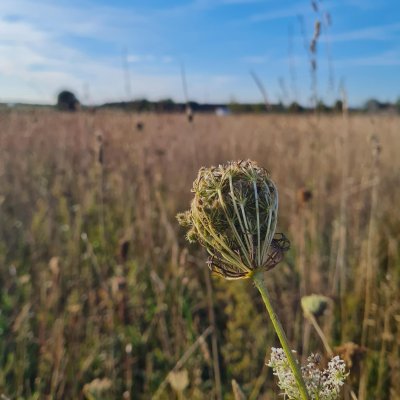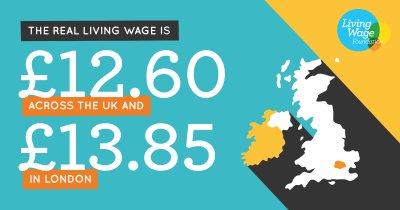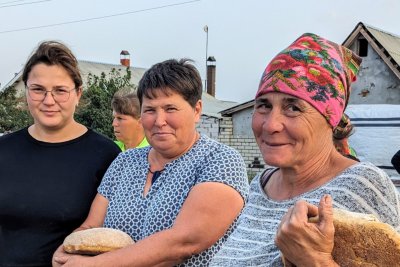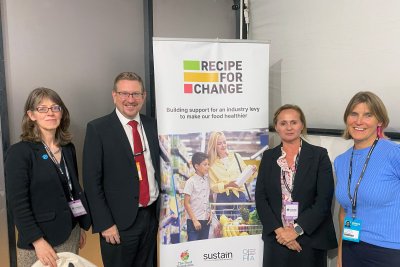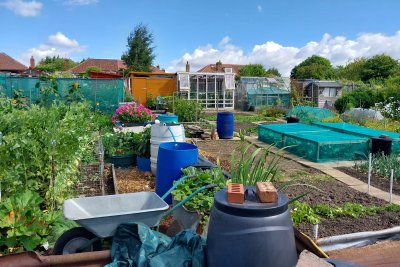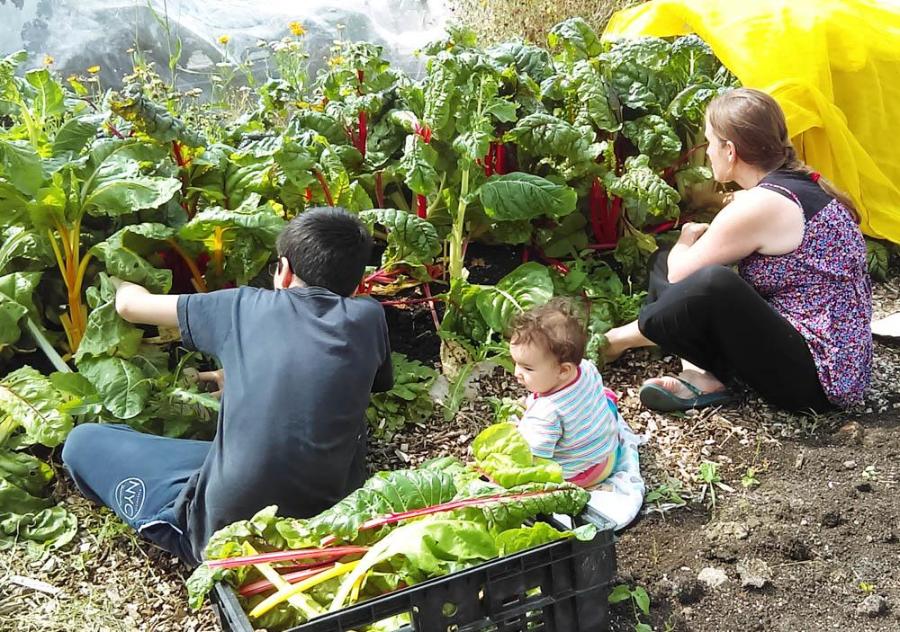 Constable Community Allotment. Credit: Hull Food Partnership
Constable Community Allotment. Credit: Hull Food Partnership
Why it’s critical to keep our community gardens and allotments growing during Coronavirus
Growing our own food is not just important for physical exercise but it can be an important source of fresh fruit and vegetables at a time of uncertainty for the food supply chain. Here Sofia Parente explains why community growing spaces and allotments should be supported by councils and landowners to grow safely during the lockdown and for the duration of this crisis.
Despite the spike in the interest in growing our own food shown by growth in sales of seeds and compost and reports from national charities such as Garden Organic and the RHS, this is a time of uncertainty for many allotment holders and community food growing spaces. In a recent survey undertaken by Sustain to growing spaces of the Capital Growth and Good to Grow networks, 70 per cent were hoping to keep growing but almost 20 per cent said that they will grow less than usual this year and almost 10 per cent said they were unsure whether they are growing anything at all this year. All this is happening against a backdrop of huge uncertainty about who will pick our crops and the UK’s ongoing reliance on imported fruit and vegetables.
The role of councils in keeping gardens growing
We welcomed the guidance from the Government that visiting allotments is included in permitted exercise (24 March 2020 ). Nevertheless, growing spaces are not limited to local authority allotments but include other spaces, big and small, including community gardens in housing estates, city farms, community gardens in local parks, privately owned land community gardens and primary schools. While there is little that can be done to ensure those in schools can stay open, there are numerous ways in which local authorities and landlords can ensure that gardens can grow safely at this time of crisis, giving local people access to much needed fresh food to top up their diets, but also a sense of security to access food during these unsettling times.
So what can councils do? We believe that encouraging gardens to continue growing and clarifying the guidelines is the first step and will be calling on councils to do just that. A blanket recommendation to close down access to community growing spaces like it’s happening in some councils should be the last resort. Unlike growing ornamental flowers, food growing is not a nice to have, but could be argued as a necessity for many. Closing down these precious growing spaces will only act to reduce access to fresh fruit and vegetables both in the short term, but also in the medium term as leaving gardens derelict will take months to turn around post lockdown. Add to this reduced access to nature and green spaces for those that use them, creating a further detrimental impact on mental health down the line.
Capital Growth and other networks are compiling the guidance available from national and international sources to help councils state a clear position, covering safety measures including:
- limiting access to the public but keeping gardens open to members and volunteers and allowing only a limited number of people at a time to ensure the two-metre distancing is respected;
- assigning individual tools and equipment as well as leaning tools, equipment and frequently touched surfaces;
- increasing hand washing practices;
- not sharing refreshments;
- clarifying that anyone with symptoms or living with someone with symptoms not to attend, and to follow government guidelines around self-isolating.
Another measure that councils should act on is to support people who want to grow their own food in their homes and gardens by providing advice and help with materials. Signposting to local centres, offering community grants and teaming up with others are all a great start. And with garden centres and garden suppliers closed, access to seeds, topsoil, compost and other inputs an issue for many growers, councils cold collaborate with the voluntary sector and their supply chains to coordinate access to inputs. This crisis is showing how the voluntary sector can rapidly respond to challenging situations with innovative solutions. For example in South London, Incredible Edible Lambeth are about to launch a campaign to encourage neighbours to share seedlings to promote home food growing. The organisation will provide resources such as seeds, pots and compost to up to 100 households. Each household will then share their seedlings with ten neighbours, growing (hopefully) lots of extra food in the process!
People Power is essential
One of the greatest assets our food growing networks have is the people growing in the gardens, and that is why many in our network are calling for their volunteers and staff to be considered as essential workers – essential to keep our gardens growing and maintained during lockdown and to support the most vulnerable to access food and nature during the crisis and beyond. And in the lack of clear guidance from central government on a range of key worker issues, we will be encouraging community gardens and local authorities to reassure growers, volunteers and allotment holders that they can continue to grow food as essential workers.
For those that have paid staff there is also an urgent need for clarity about the financial support available to community gardens; larger community gardens often have enterprise arms even though they are charities as they have been encouraged over the years to be more self-reliant and generate more income from visitors and from the sale of goods and services. Without volunteers, they face increased costs as well as loss of revenue from sales of goods and services such as school visits or corporate days. Social Farms & Gardens and The London Association of City Farms and Community Gardens are spearheading this issue and have written open letters to funders, and to DEFRA and other government organisations asking for confirmation that social enterprises will be given at least the equivalent financial support of similar for-profit small businesses through the small business grant fund of £10,000.
Creating a resilient food future
But this isn’t just about responding to the crisis – it’s also how we learn from it. We want to see local authorities to start to think outside the box about how they can help increase production in our urban areas – for example what land in parks or other areas could be allocated for larger scale food growing. This is already happening in Ottawa, in the Canadian State of Victoria, where the city staff are currently in discussions with farmers and seed libraries to come up with a shortlist of easy-to-grow edible plants that would be ideal for home gardening. Some crops are harder to grow than others, but nutritious leafy greens such as kale and chard thrive in temperate climates and could be a great start.
Over the medium to longer term, local authorities and other landlords who were not already thinking about local food production in terms of climate and nature emergency, should now have had the wakeup call. They need to prioritise the identification and allocation of land that could be used for urban food growing. A recent study from the University of Sheffield concluded that growing fruit and vegetables in just 10 per cent of a city’s gardens and other urban green spaces could provide 15 per cent of the local population with their ‘five a day’. They found that green spaces including parks, gardens, allotments, roadside verges and woodland cover 45 per cent of Sheffield – a figure similar to other UK cities. Putting domestic gardens, allotments and suitable public green spaces together would open up 98m2 per person in Sheffield for growing food. This equates to more than four times the 23m2 per person currently used for commercial horticulture across the UK.
Food governance has never been more important as it is now in this food emergency. Working in partnership and bringing together multiples stakeholders across different sectors is essential to respond in a coordinated fashion to the food emergency and plan for a more resilient food system. The coordinated response by many food partnerships of the Sustainable Food Places network is a testimony that food governance mechanisms at the local level should be encouraged in every single local area. This is not just my opinion but one of the recommendations from the FAO’s latest briefing ‘Urban food systems and COVID-19: The role of cities and local governments in responding to the emergency’.
Coronavirus Food Alert: Sustain's work on food resilience in the COVID-19 coronavirus pandemic.We are helping secure food for vulnerable people and supporting local emergency responses.
Sustain
The Green House
244-254 Cambridge Heath Road
London E2 9DA
020 3559 6777
sustain@sustainweb.org
Sustain advocates food and agriculture policies and practices that enhance the health and welfare of people and animals, improve the working and living environment, promote equity and enrich society and culture.
© Sustain 2024
Registered charity (no. 1018643)
Data privacy & cookies
Icons by Icons8
